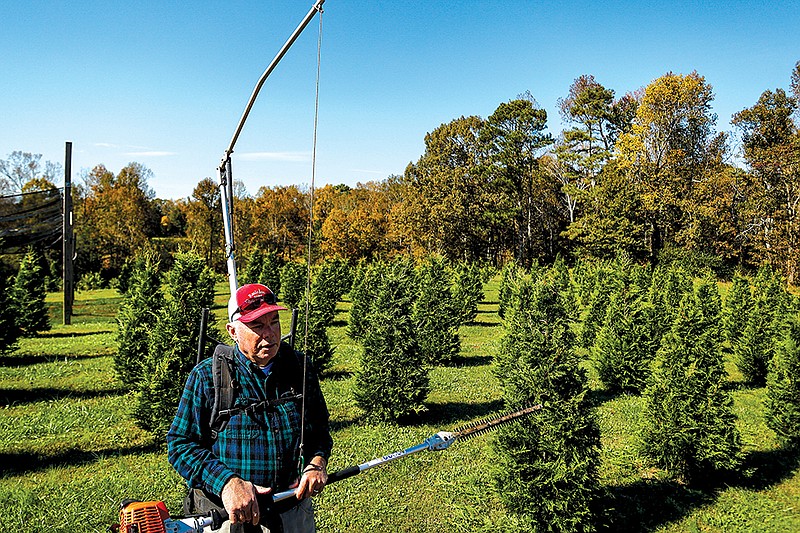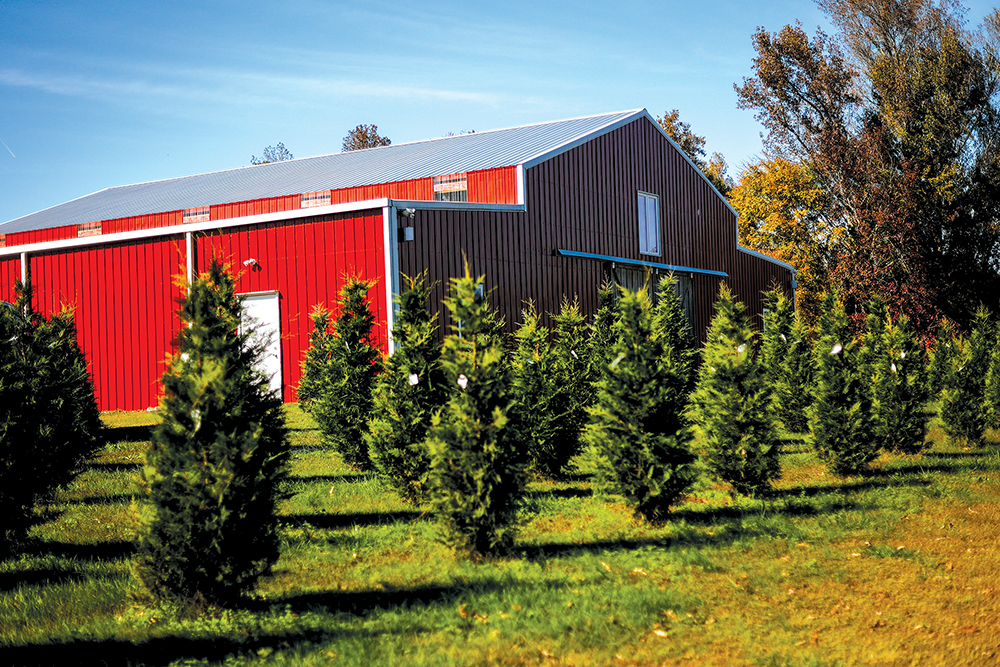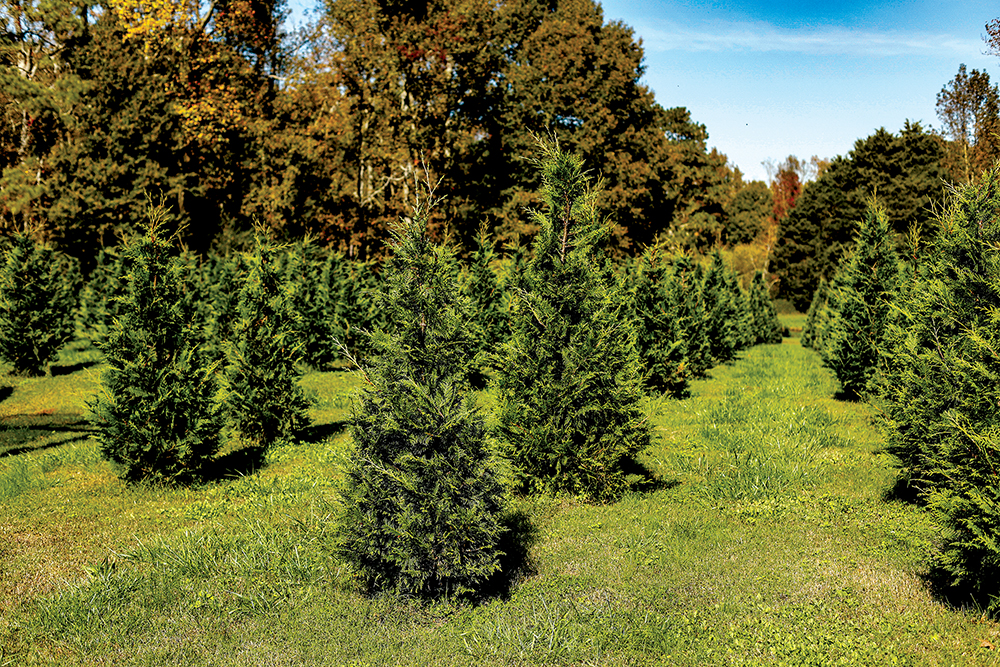For most families, keeping a Christmas tree alive requires maybe a monthlong commitment.
For the people who grow them, it's a yearround job.
"You work on a tree farm all year long, whether you're big or small," says Dr. Brent Campbell, whose family owns and operates Campbell's Christmas Tree Farm in Harrison, Tennessee.
His is one of a handful of choose-and-cut Christmas tree farms in the region around Chattanooga, a swath stretching from Sweetwater, Tennessee, to Pisgah, Alabama, to LaFayette, Georgia. With about 600 trees in various stages of growth, Campbell's is one of the smallest farms - trees on some area farms number in the thousands. But even if the workload is comparatively lighter, the list of chores is long.
"You're doing a lot of mowing during the summer, applying fungicide and insecticide," Campbell says. "You prune a couple of times during the summer. When you start getting ready for the selling season, you might be blowing off leaves, getting lights set up for decorating."
Before the selling season begins, many growers, including Campbell, open their farms to local photographers, who book families for Christmas portraits using the evergreens and other scenery as backdrops. Later, chosen trees will star in selfies as families commemorate the moment that the trek through the field results in a specimen worthy to take home.
"The best part is the families you get to meet," says Jeremy Maanum of Santa Land Christmas Tree Farm in LaFayette, Georgia. "We get to see families that used to be little kids running around, and now they've got their own little kids running around. That's why we stay in it."
It's those few days of active selling in late November and early December that make the rest of the year worthwhile, growers say. Once Christmas is over, it's back to the endless labor that makes the festive season possible.
"Come January, you take down all the decorations and start stump grinding," Campbell says. "Then in February and March, we plant and get everything in the ground. Sometimes you have to move fences to open things up a little more."
Other farmers tell similar stories of fungicide, insecticide and fertilizer applications. Of prunings to shape the trees. And of mowing - so much mowing - to keep the fields around the trees walkable.
"I work at it all year," says Alvin Kittle, owner of Kittle Christmas Tree Farm in Ringgold, Georgia. "I spend most of my time mowing grass out of them."
"We knew it would be work," agrees Paula Wheeler, whose family owns and operates Wheeler's Christmas Tree Farm in Tunnel Hill, Georgia. "Anytime you farm, there's work involved. But the amount of work? We never dreamed of the time and resources and energy it would take to maintain and keep it going.
"There's always the spraying and trimming and mowing," she says. "But then you also might get a torrential downpour and the wind blows and all the trees are laid down sideways, and you have to go straighten that out."
According to the National Christmas Tree Association, more than 350 million Christmas trees are growing on farms across the United States. Each year, 25 million to 30 million trees are sold.
How long does it take to grow a 7-foot Christmas tree?
According to the National Christmas Tree Association, it can take as many as 15 years to grow a tree of typical height (6 to 7 feet) or as little as four years, but the average growing time is seven years.
In 2020, the COVID-19 pandemic fueled an increase in interest in real Christmas trees, though it didn't significantly affect the numbers sold. Families who had spent months with lives upended, directly or indirectly, by sickness, death, economic turmoil and restrictions on gatherings and travel were longing for the comforts of Christmas. Tree farms offered a chance to create meaningful memories in the relative safety of shopping outdoors.
"Last year was a phenomenal year," says Mike Murdock of Cove Christmas Tree Farm in Chickamauga, Georgia. "We actually could have sold quite a few more trees than we had. People were happy to get out in the country, get out in the fresh air and be able to cut their own tree. It was a great time."
The only problem? There are only so many trees to go around in a given year. Tree farmers plant in one-year cycles. The species most often grown around Chattanooga - Leyland and Murray cypress - need four to five years to reach 6 to 8 feet, the most sought-after heights. Cut sooner, and you get younger, shorter trees. Not to mention fewer trees the next season.
The best-selling species in the U.S. are:
1. Fraser fir2. Noble fir3. Douglas fir4. Balsam fir5. Scotch pine
"Ultimately, it was a very strong year for farm-grown tree sales," the association's website notes. Sales started earlier in the season and grew at a rapid pace. "However, the reality was, the tight supply of trees that were mature enough to be sold in 2020 was a real constraint. That tight supply capped the notion of a big leap in sales numbers."
Maanum says Santa Land did "an entire season's worth of business in just three days" during their Thanksgiving weekend opening last year. By the next weekend, the few remaining cuttable trees were gone and they were done for the season.
Christmas Carroll Tree Farm in LaFayette saw similar good fortune. "Last year was a very busy year," says owner Ray Carroll. "We sold out of all the trees we could sell in a little over two weeks last year. I expect this year to be just as good."
Dan Raulston, owner of Raulston Acres Christmas Tree Farm in Rock Spring, Georgia, and president of the Tennessee Christmas Tree Growers Association, says he, too, closed earlier than he anticipated last year because of the surge in sales. He believes this year may be just as strong.
"With all the supply-chain issues and inflation rumors and everything going on with that, artificial trees are going to be more expensive and harder to get this year," he predicts. "That puts added pressure on the real tree market. Plus, our industry has been advertising to get people to buy real trees. All those factors, plus people wanting to get outside and make memories and family traditions, I think it's going to be a big year."
A closer look at area growers:
CAMPBELL'S CHRISTMAS TREE FARM
7503 Walnut Hills Drive, Harrison, Tennessee
- Brief history: Dr. Brent Campbell says he planted his first trees in 2012. "We grew them in pots before removing then to the fields. That's how small we are." Campbell, who has a family medical practice in Hixson, says he has "an entrepreneurial spirit" and was looking for something to do with his acreage that wouldn't permanently alter the land. This is his fourth season selling.
- Species: Virginia pine, white pine, Murray cypress "and a few other varieties I'm experimenting with right now." He also sells precut Fraser firs.
- The tree at home: "Each year we select a different one," says Campbell. "We like to see how it turns out and what it looks like and understand its certain characteristics."
CAMP'S CHRISTMAS FOREST
415 Kile Road, Sweetwater, Tennessee
- Brief history: Fred Camp says he was in high school when he started working for Vale Forest Tree Farm in 1973, eventually becoming the manager. "Then in 1989, we started growing our own trees here in Sweetwater."
- Species: Mostly white pine, but other species may be available depending on the year. Camp also grows Virginia pine, Scotch pine, Leyland cypress, Murray cypress, Carolina Sapphire, Blue Ice, Naylor's Blue, Silver Smoke, a few Douglas fir and a handful of Canaan fir, Norway spruce, white spruce and eastern red cedar.
- The tree at home: Camp says his wife, Linda, picks the tree every year. "She pretty much likes Virginia pine. It has a little bit stiffer needle than the white pine."
The states that grow the most trees (in the millions or hundreds of thousands) are:
1. Oregon (Noble fir and Douglas fir)2. North Carolina (Fraser fir)3. Michigan4. Pennsylvania5. Wisconsin
CHRISTMAS CARROLL TREE FARM
7206 State Highway 95, LaFayette, Georgia
- Brief history: Owner Ray Carroll, 73, says he planted his first crop of trees 15 or 16 years ago. His farm is only about an acre and a half, but a second farm at his son's house has another 2 acres of trees that were planted about four years ago. Carroll says he was working full time when he started the farm and thought the trees could supplement his retirement income. The farm has proven to be a full-time job.
- Species: The farm grows Carolina Sapphire, Leyland cypress and Murray cypress and trucks in precut Fraser firs from North Carolina.
- Price: Unlike farms that charge by the foot, Carroll prefers to size up the tree's height and quality to set his price per tree. Fraser firs cost more because of the shipping charges involved.
- The tree at home: "I use both the Leyland cypress and the Fraser fir," say Carroll says. "I like both of them. The Frasers drop more needles than the Leylands do."
COVE CHRISTMAS TREE FARM
654 Kensington Road, Chickamauga, Georgia
- Brief history: "When our son was young, we went to a Christmas tree farm south of LaFayette," says Mike Murdock, who co-owns the farm with wife Regina. "The people were super nice, and so we started going back every year. Then a piece of property came up for sale that had Christmas trees on it. We were able to buy it. That was 20 years ago, and we've been doing it ever since."
- Species: "For this year we're only going to have one small crop of Green Giants. Typically we grow Murray cypress, Leyland cypress and Blue Sapphire," says farm co-owner Mike Murdock. "It's questionable, but we may have a batch of Murray and Leylands ready next year. We've got a lot of trees in the ground trying to play catch-up."
- Price: Trees average $45 to $50, based on height of 6 to 7 feet.
- The tree at home: Depends on what's left. "It may not be the best one on the farm, but we always get one up," Murdock says.
KITTLE CHRISTMAS TREE FARM
985 Salem Valley Road, Ringgold, Georgia
- Brief history: Alvin Kittle, 88, says he started the farm in 1978 after hearing people talk about the fun of going out in the woods and hunting a tree with their dad. "It started as a hobby and turned out pretty good," he says. He has 10 to 12 acres planted in trees.
- Species: The farm grows white pine, Leyland cypress and Carolina Sapphire and ships in Fraser fir from the mountains of Blairsville, Georgia.
- Price: "Anything on the farm you cut is $40. We haven't changed our pricing in several years."
- A favorite memory: "We put most of [the baled trees] on top of the car. The funniest thing we ever tried to do was put a Christmas tree on top of a convertible. We had it all bundled up and they were asking, 'How are we going to haul it?' They put the top down, put the tree on top of what was left and away they went. It was a cool day. I'm sure they were pretty chilly by the time they got home."
- The tree at home: "We usually put a Carolina Sapphire up in our house. It's got an orange cypress-like smell to it. I just like the smell of it when I come in," says Kittle.
RAULSTON ACRES CHRISTMAS TREE FARM
2572 Georgia Highway 95, Rock Spring, Georgia
- Brief history: Owner Dan Raulston had been raising a small herd of Angus beef cattle when he came up with the idea in late 2007, when "diesel fuel was sky high and feed was sky high but the prices for cattle were low." He started planting Christmas trees in March of 2008. He didn't know much about Christmas trees going in, "but the more I saw, the better I liked it." He started selling from that initial crop of 450 trees in December of 2011. Now, he's up to 5,500 trees.
- Species: The farm grows Murray cypress, Carolina Sapphire, Blue Ice cypress, Virginia pine, Green Giant and a few white pines. It ships in Fraser firs from North Carolina.
- Price: The best farm-grown specimens sell for about $7.50 per foot. Fraser firs cost about $9 per foot.
- The tree at home: Dan Raulston and his wife, Karen, cycle through different varieties. "We have had Fraser fir, white pine, Carolina Sapphire. Last year, the main tree we had was a Virginia pine. This year, if I can find one left, I may get a Murray cypress," he says.
SANTA LAND CHRISTMAS TREE FARM
2574 Concord Road, LaFayette, Georgia
- Brief history: Owner Jeremy Maanum says the farm has been around more than 25 years, and he took it over for his cousins "a little over 15 years ago." Christmas trees occupy about 5 acres, down from 8-plus when they were starting out.
- Species: Leyland cypress and Murray cypress
- Price: $7 per foot. Customers can take large cane poles with them into the fields to compare the measurements.
- A favorite memory: Maanum says some customers come in knowing they want "the biggest tree you have." One year, he met the request by showing bigger specimens that had been left to grow on a fallow field. The customer chose a whopper, Maanum says. "I bet you it was 18 feet tall. He backed his truck and trailer in, we dropped it on a tarp and roped up the tarp. It took seven of us to get it on the trailer. How he got it in his house, I don't know."
- The tree at home: Maanum says he and his wife, Juanita, will use a Leyland or Murray cypress. "We pick a tree with a bald, open spot or a crooked trunk. A lot of customers do not like a crooked trunk, and it's hard to keep your trunk all straight. If one decides to grow crooked, we cut it down for our home."
THORNHILL CHRISTMAS TREE FARM
15017 Alabama Highway 71, Pisgah, Alabama
- Brief history: Cherie Thornhill-Ramage says her dad planted the first Christmas trees on his farm in 1978. She and her husband, Skyler Ramage, took over when her father died eight years ago. The 100-acre farm has "probably 20 acres" in trees, she says.
- Species: White pine and Leyland cypress
- Price: In a change this year, they've set prices for 5- and 6-foot trees at $55, 7- and 8-foot trees at $65 "and anything above that would be $75 or $85."
- A favorite memory: Watching people lose enthusiasm when they cut the tree themselves. "A lot of people, once they make the first two or three saw cuts, want someone else to do it for them," Thornhill-Ramage says. "It looks really fun on Hallmark [movies], but it's harder than you think."
- The tree at home: "We usually get the Leyland," she says.
WHEELER'S CHRISTMAS TREE FARM
1144 Dogwood Valley Road, Tunnel Hill, Georgia
- Brief history: Owner Paula Wheeler says a visit to a Christmas tree farm became a ritual when she and her husband were still dating. "That stuck after we got married and had children," she says. "We would always go and cut a tree on Thanksgiving Day and decorate it." Then one year, the tree farm they had gone to for years and years posted signs that they were going out of business. "I was devastated," Wheeler says. "It was such a part of our family, of our tradition." Realizing that they were "blessed with property," they decided there was no better way to keep the tradition going than to go into business themselves. They planted their first trees in 2009. They've been selling for nine years.
- Species: The farm grows Murray cypress, Carolina Sapphire, Blue Ice and Silver Smoke. It brings in precut Fraser firs.
- Price: Typically $7 per foot, but they'll make deals on lesser-quality trees.
- A favorite memory: Wheeler says it's not uncommon for trees to grow with crooked bases. The worst may not be salvageable, so the branches will be used for wreaths or garlands. One year a family picked a tree with one of the funkiest bases, Wheeler recalls. "They said, 'We just want to celebrate differences this year.' They just wanted something fun. This tree was growing sideways a couple of feet, then up again, then sideways again. It was a funny-looking tree." It was so oddly shaped that Wheeler offered it as a freebie, but the family insisted on paying. They sent a photo to show that it "took some creative thinking," but they got it up and decorated. "This tree brought joy to our family," their message said. "It gave us a story to tell."
- The tree at home: "We always like to experiment," Wheeler says. "My favorite is the Murray cypress with its deep green color." But by trying different varieties, they get firsthand experience to give customers advice.



